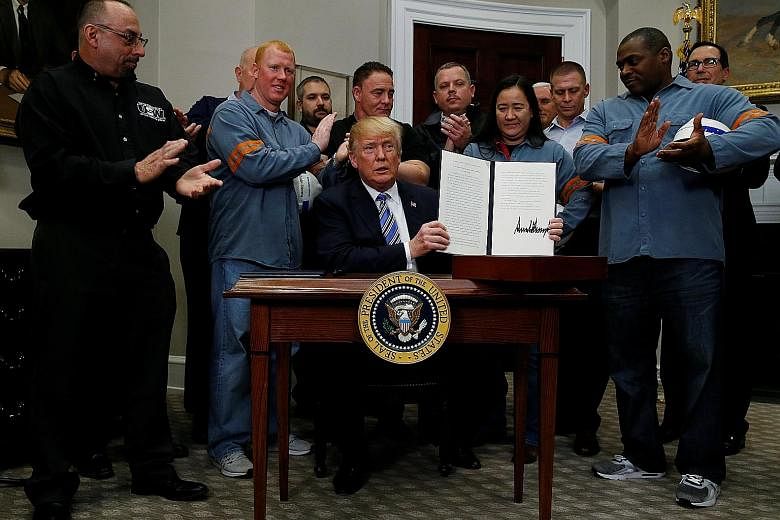US President Donald Trump has imposed steep new tariffs on imported steel and aluminium, drawing sharp criticism at home and abroad as many warned of a global trade war. The move, however, is seen as a political win for him, at least in the short term.
Mr Trump temporarily exempted close allies Canada and Mexico from the tariffs - 25 per cent on imported steel and 10 per cent on imported aluminium - which go into effect on March 23. He also left room for other countries to negotiate exclusions.
"The actions we are taking today are not a matter of choice; they are a matter of necessity for our security," he said in a ceremony on Thursday at the White House, flanked by steel and aluminium workers.
He said the move was necessary to rebuild vital industries decimated by foreign competition.
"Our factories were left to rot and to rust all over the place; thriving communities turned into ghost towns," he said. "The workers who poured their souls into building this great nation were betrayed. But that betrayal is now over."
Mr Trump indicated he would be flexible towards America's "real friends", saying Canada and Mexico would be permanently exempted if the ongoing renegotiation of the North American Free Trade Agreement (Nafta) is successful.
Canada, the largest supplier of both steel and aluminium to the United States, welcomed the exemption, but vowed to keep pressing Washington until the threat of tariffs disappeared. Mexico said negotiations for Nafta must be independent of the tariff issue.
In Beijing, China's Commerce Ministry said it resolutely opposed the tariffs, and that they would "seriously impact the normal order of international trade". It called on the US to withdraw the measures as quickly as possible.
China accounts for a fraction of US steel imports, but its industrial expansion has helped create a global glut that has driven down prices.
In his announcement, Mr Trump singled out Germany for criticism, accusing the European ally of behaving unfairly by contributing much less than the US towards the funding of Nato.
The European Union's top trade official Cecilia Malmstrom, however, said the entire bloc should be excluded from the tariffs as a close ally, vowing to seek more clarity from Washington at a meeting in Brussels today .
In the US, opposition to the tariff plans came from business leaders and prominent members of Mr Trump's own Republican Party, who fear they could spark retaliation from other countries and hurt the economy.
Analysts predict there will be net job losses for the US, as steel-and aluminium-consuming industries face higher costs. The Council on Foreign Relations said its research showed steel tariffs could kill 45,000 jobs in the US car industry alone, equal to one-third of the steel workforce.
But the steel industry, which employs around 140,000 people, will certainly see job growth.
On Wednesday, Pittsburgh-based US Steel announced it would resume steelmaking at a big plant in Illinois, bringing 500 former employees back to work, 21/2 years after they were idled.
"A political impact always tends to be positive when, on the one side, as with the tariffs, there is a targeted beneficiary, in this case the aluminium and steel industries," Dr Glenn Altschuler, professor of American Studies at Cornell University, told The Straits Times.
With the mid-term congressional election in November, Mr Trump's move could give a boost to Republicans.
But concerns remain over a possible trade war, given the President's long-held protectionist convictions and the trade-deficit hawks driving his administration's trade policy. Retaliation by some countries - for instance, Japan or Brazil - also remains a possibility.
The trade barriers came just hours after a group of 11 countries signed the Trans-Pacific Partnership trade deal, which no longer includes the United States.
SEE EDITORIAL

